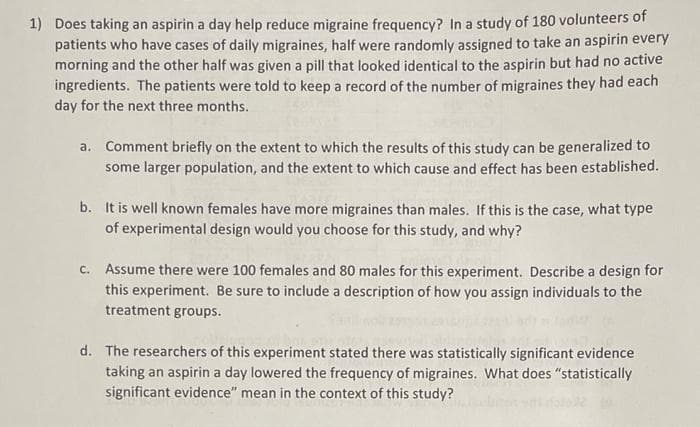1) Does taking an aspirin a day help reduce migraine frequency? In a study of 180 volunteers of patients who have cases of daily migraines, half were randomly assigned to take an aspirin every morning and the other half was given a pill that looked identical to the aspirin but had no active ingredients. The patients were told to keep a record of the number of migraines they had each day for the next three months. a. Comment briefly on the extent to which the results of this study can be generalized to some larger population, and the extent to which cause and effect has been established. b. It is well known females have more migraines than males. If this is the case, what type of experimental design would you choose for this study, and why?
1) Does taking an aspirin a day help reduce migraine frequency? In a study of 180 volunteers of patients who have cases of daily migraines, half were randomly assigned to take an aspirin every morning and the other half was given a pill that looked identical to the aspirin but had no active ingredients. The patients were told to keep a record of the number of migraines they had each day for the next three months. a. Comment briefly on the extent to which the results of this study can be generalized to some larger population, and the extent to which cause and effect has been established. b. It is well known females have more migraines than males. If this is the case, what type of experimental design would you choose for this study, and why?
Linear Algebra: A Modern Introduction
4th Edition
ISBN:9781285463247
Author:David Poole
Publisher:David Poole
Chapter2: Systems Of Linear Equations
Section2.4: Applications
Problem 28EQ
Related questions
Question

Transcribed Image Text:1) Does taking an aspirin a day help reduce migraine frequency? In a study of 180 volunteers of
patients who have cases of daily migraines, half were randomly assigned to take an aspirin every
morning and the other half was given a pill that looked identical to the aspirin but had no active
ingredients. The patients were told to keep a record of the number of migraines they had each
day for the next three months.
a. Comment briefly on the extent to which the results of this study can be generalized to
some larger population, and the extent to which cause and effect has been established.
b. It is well known females have more migraines than males. If this is the case, what type
of experimental design would you choose for this study, and why?
c. Assume there were 100 females and 80 males for this experiment. Describe a design for
this experiment. Be sure to include a description of how you assign individuals to the
treatment groups.
d. The researchers of this experiment stated there was statistically significant evidence
taking an aspirin a day lowered the frequency of migraines. What does "statistically
significant evidence" mean in the context of this study?
Expert Solution
This question has been solved!
Explore an expertly crafted, step-by-step solution for a thorough understanding of key concepts.
Step by step
Solved in 4 steps

Recommended textbooks for you

Linear Algebra: A Modern Introduction
Algebra
ISBN:
9781285463247
Author:
David Poole
Publisher:
Cengage Learning

Glencoe Algebra 1, Student Edition, 9780079039897…
Algebra
ISBN:
9780079039897
Author:
Carter
Publisher:
McGraw Hill

Holt Mcdougal Larson Pre-algebra: Student Edition…
Algebra
ISBN:
9780547587776
Author:
HOLT MCDOUGAL
Publisher:
HOLT MCDOUGAL

Linear Algebra: A Modern Introduction
Algebra
ISBN:
9781285463247
Author:
David Poole
Publisher:
Cengage Learning

Glencoe Algebra 1, Student Edition, 9780079039897…
Algebra
ISBN:
9780079039897
Author:
Carter
Publisher:
McGraw Hill

Holt Mcdougal Larson Pre-algebra: Student Edition…
Algebra
ISBN:
9780547587776
Author:
HOLT MCDOUGAL
Publisher:
HOLT MCDOUGAL